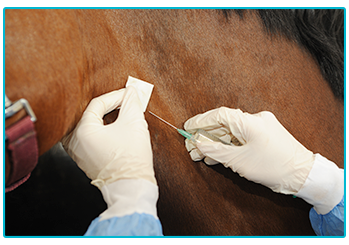Tapeworms are pesky creatures that can get into horses’ digestive systems. There are 3 different species of tapeworm that can be found in horses. Anoplocephala perfoliata is the most common in the UK, which are flat segmented worms that can be up to 8cm long. Your horse’s health is very important to us at The Insurance Emporium, which is why we’ve asked our horse health expert for this advice on equine tapeworm.

A Mite-y Issue!
Tapeworms get into horses’ systems through oribatid mites. These mites eat tapeworm eggs in horse droppings in pasture. The mites are then eaten by grazing horses. Inside the horse’s gut, the larvae develop into adult tapeworms and attach themselves to the intestinal wall. Usually, tapeworms attach at the ileocaecal junction, where they can damage the gut lining and cause obstruction, which can lead to colic. Tapeworms can also cause weight loss, peritonitis, poor growth and other gastrointestinal disturbances.

Put to the test…
It’s important to be aware of tapeworms because it’s not easy to diagnose infections with routine faecal egg counts. Vets use blood tests to identify tapeworm infections. Over recent years, an easy-to-use saliva test, which is called the EquiSal test, has been developed to identify tapeworm afflictions. Your vet may be able to arrange routine tapeworm testing. However, if you can’t get routine tests on your horse, it’s worth getting them treated for tapeworm every six months.
Targeted Treatment
After testing for tapeworms, or in the event that your horse can’t be tested for tapeworms, your horse should receive targeted treatment with an appropriate wormer. Giving your horse targeted treatment will reduce the likelihood that a resistance to wormers will develop. Your horse only needs to be treated for tapeworm twice a year as tapeworms have a six-month lifecycle. Horses are usually treated for tapeworm in spring and at the end of the summer grazing period.

Which Wormer?
When selecting a wormer, it’s important to know that not all wormers kill tapeworms. The wormer must contain pyrantel or praziquantel in order to treat tapeworms effectively. In the past, horses would be given a double dose of pyrantel to treat them for tapeworms. Now, there are a variety of wormers on the market that contain these products. There are also several combination wormers available that can be used to treat other endoparasites as well as tapeworm.
If you feel your horse might have tapeworm, or you want to arrange routine testing for it, speak to your vet. They can also help if you’re not sure which wormer to use and when you should give it to your horse. Getting your horse treated for these pesky parasites can help keep it happy and healthy!
All content provided on this blog is for informational purposes only. We make no representations as to the accuracy or completeness of any information on this site or found by following any link on this site. We will not be liable for any errors or omissions in this information nor for the availability of this information. We will not be liable for any loss, injury or damage arising from the display or use of this information. This policy is subject to change at any time.


